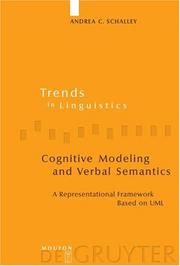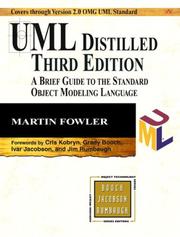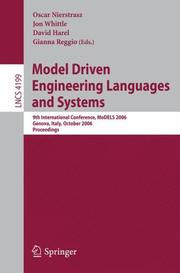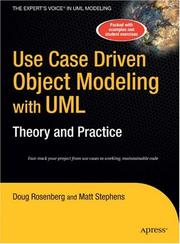| Listing 1 - 5 of 5 |
Sort by
|

ISBN: 3110179512 3110909626 Year: 2004 Volume: 154
Abstract | Keywords | Export | Availability | Bookmark
 Loading...
Loading...Choose an application
- Reference Manager
- EndNote
- RefWorks (Direct export to RefWorks)
This book presents a unique approach to the semantics of verbs. It develops and specifies a decompositional representation framework for verbal semantics that is based on the Unified Modeling Language (UML), the graphical lingua franca for the design and modeling of object-oriented systems in computer science. The new framework combines formal precision with conceptual flexibility and allows the representation of very complicated details of verbal meaning, using a mixture of graphical elements as well as linearized constructs. Thereby, it offers a solution for different semantic problems such as context-dependency and polysemy. The latter, for instance, is demonstrated in one of the two well-elaborated applications of the framework within this book, the investigation of the polysemy of German setzen. Besides the formal specification of the framework, the book comprises a cognitive interpretation of important modeling elements, discusses general issues connected with the framework such as dynamic and static aspects of verbal meanings, questions of granularity, and general constraints applying to verbal semantics. Moreover, first steps towards a compositional semantics are undertaken, and a new verb classification based on this graphical approach is proposed. Since the framework is graphical in nature, the book contains many annotated figures, and the framework's modeling elements are illustrated by example diagrams. Not only scholars working in the field of linguistics, in particular in semantics, will find this book illuminating because of its new graphical approach, but also researchers of cognitive science, computational linguistics and computer science in general will surely appreciate it.
Semantics --- Mathematical models --- UML (Computer science) --- Programming languages (Electronic computers) --- Cognitive grammar --- Lexicology. Semantics --- Psycholinguistics --- Cognitive grammar. --- Sémantique --- UML (Informatique) --- Langages de programmation --- Grammaire cognitive --- Modèles mathématiques --- #KVHA:Semantiek --- Cognitive linguistics --- Grammar, Comparative and general --- Programming language semantics --- Unified Modeling Language (Computer science) --- Computer software --- Modeling languages (Computer science) --- Object-oriented methods (Computer science) --- Mathematical linguistics --- Mathematical models. --- Semantics. --- Development

ISBN: 0321193687 9780321193681 Year: 2010 Publisher: Boston, MA: Addison-Wesley,
Abstract | Keywords | Export | Availability | Bookmark
 Loading...
Loading...Choose an application
- Reference Manager
- EndNote
- RefWorks (Direct export to RefWorks)
681.3*D1 --- 681.3*D15 --- 681.3*D15 Software: object-oriented programming --- Software: object-oriented programming --- 681.3*D1 Programming techniques--See also {681.3*E} --- Programming techniques--See also {681.3*E} --- UML (=Unified Modelling Language). --- UML --- Computer software --- Object-oriented methods (Computer science) --- UML (Computer science) --- Unified Modeling Language (Computer science) --- Modeling languages (Computer science) --- Object development methods (Computer science) --- Object orientation (Computer science) --- Object-oriented development (Computer science) --- Object technology (Computer science) --- System design --- Development of computer software --- Software development --- Development --- computerprogramma's --- object-oriented programming --- programmeertalen --- object-gericht programmeren --- 525.5 --- informatica --- Object-oriented methods (Computer science). --- UML (Computer science). --- Development. --- Méthode orientée object (Informatique) --- Logiciels --- UML (Informatique) --- Développement --- Computer software - Development --- Computer software-development --- Uml (computer science)

ISBN: 9783540457725 3540457720 3540457739 Year: 2006 Publisher: Berlin ; New York : Springer,
Abstract | Keywords | Export | Availability | Bookmark
 Loading...
Loading...Choose an application
- Reference Manager
- EndNote
- RefWorks (Direct export to RefWorks)
Computer software --- UML (Computer science) --- Logiciels --- UML (Informatique) --- Development --- Congresses. --- Congresses --- Développement --- Congrès --- Computer Science --- Engineering & Applied Sciences --- 681.3*D2 --- Software engineering: protection mechanisms; standards--See also {681.3*K63}; {681.3*K51} --- Information Technology --- Software Engineering --- 681.3*D2 Software engineering: protection mechanisms; standards--See also {681.3*K63}; {681.3*K51} --- Unified Modeling Language (Computer science) --- Computer science. --- Computer programming. --- Software engineering. --- Programming languages (Electronic computers). --- Computer simulation. --- Management information systems. --- Computer Science. --- Programming Techniques. --- Software Engineering. --- Programming Languages, Compilers, Interpreters. --- Simulation and Modeling. --- Management of Computing and Information Systems. --- Modeling languages (Computer science) --- Object-oriented methods (Computer science) --- Computer-based information systems --- EIS (Information systems) --- Executive information systems --- MIS (Information systems) --- Sociotechnical systems --- Information resources management --- Management --- Computer modeling --- Computer models --- Modeling, Computer --- Models, Computer --- Simulation, Computer --- Electromechanical analogies --- Mathematical models --- Simulation methods --- Model-integrated computing --- Computer languages --- Computer program languages --- Computer programming languages --- Machine language --- Electronic data processing --- Languages, Artificial --- Computer software engineering --- Engineering --- Computers --- Electronic computer programming --- Electronic digital computers --- Programming (Electronic computers) --- Coding theory --- Informatics --- Science --- Communication systems --- Programming --- Information Systems.

ISBN: 9783540752080 3540752080 3540752099 Year: 2007 Publisher: Berlin, Germany ; New York, New York : Springer-Verlag,
Abstract | Keywords | Export | Availability | Bookmark
 Loading...
Loading...Choose an application
- Reference Manager
- EndNote
- RefWorks (Direct export to RefWorks)
Computer software --- UML (Computer science) --- Logiciels --- UML (Informatique) --- Development --- Congresses. --- Développement --- Congrès --- Model-driven software architecture --- Computer Science --- Engineering & Applied Sciences --- Unified Modeling Language (Computer science) --- Modeling languages (Computer science) --- Object-oriented methods (Computer science) --- Information Technology --- Software Engineering --- Computer science. --- Software engineering. --- Programming languages (Electronic computers). --- Computers. --- Computer simulation. --- Management information systems. --- Engineering. --- Computer Science. --- Theory of Computation. --- Engineering, general. --- Software Engineering. --- Programming Languages, Compilers, Interpreters. --- Simulation and Modeling. --- Management of Computing and Information Systems. --- MDA (Model-driven software architecture) --- Software architecture --- Construction --- Industrial arts --- Technology --- Computer-based information systems --- EIS (Information systems) --- Executive information systems --- MIS (Information systems) --- Sociotechnical systems --- Information resources management --- Management --- Computer modeling --- Computer models --- Modeling, Computer --- Models, Computer --- Simulation, Computer --- Electromechanical analogies --- Mathematical models --- Simulation methods --- Model-integrated computing --- Automatic computers --- Automatic data processors --- Computer hardware --- Computing machines (Computers) --- Electronic brains --- Electronic calculating-machines --- Electronic computers --- Hardware, Computer --- Computer systems --- Cybernetics --- Machine theory --- Calculators --- Cyberspace --- Computer languages --- Computer program languages --- Computer programming languages --- Machine language --- Electronic data processing --- Languages, Artificial --- Computer software engineering --- Engineering --- Informatics --- Science --- Communication systems --- Information theory. --- Information Systems. --- Communication theory --- Communication

ISBN: 1430243066 1281491055 9786611491055 1430203692 1590597745 9781590597743 9781430243052 1430243058 Year: 2013 Publisher: [Lieu de publication inconnu]: Apress,
Abstract | Keywords | Export | Availability | Bookmark
 Loading...
Loading...Choose an application
- Reference Manager
- EndNote
- RefWorks (Direct export to RefWorks)
Use Case Driven Object Modeling with UML: Theory and Practice shows how to drive an object-oriented software design from use case all the way through coding and testing, based on the minimalist, UML-based ICONIX process. In addition to a comprehensive explanation of the foundations of the approach, the book makes extensive use of examples and provides exercises at the back of each chapter. This book leads by example. It demonstrates common analysis and design errors, shows how to detect and fix them, and suggests how to avoid making the same errors in the future. The book also encourages you to examine its UML examples and to search for specific errors. You'll get clues, then later receive the answers during review sessions toward the end of the book.
UML (Computer science) --- Unified Modeling Language (Computer science) --- Computer software --- Modeling languages (Computer science) --- Object-oriented methods (Computer science) --- Development --- Information Technology --- Software Engineering --- Approche orientee objet (Informatique) --- Cas d'utilisation (Ingenierie des systemes) --- UML (Informatique) --- 681.3*D23 --- 681.3*D2 --- 681.3*D23 Coding: pretty printers; program editors; reentrant code; standards (Softwareengineering) --- Coding: pretty printers; program editors; reentrant code; standards (Softwareengineering) --- 681.3*D2 Software engineering: protection mechanisms; standards--See also {681.3*K63}; {681.3*K51} --- Software engineering: protection mechanisms; standards--See also {681.3*K63}; {681.3*K51} --- Computer science. --- Software engineering. --- Programming Languages, Compilers, Interpreters. --- Software Engineering/Programming and Operating Systems. --- Informatics --- Science --- Computer software engineering --- Engineering --- Programming languages (Electronic computers). --- Computer languages --- Computer program languages --- Computer programming languages --- Machine language --- Electronic data processing --- Languages, Artificial --- 681.3*D32 --- 681.3*D32 language classifications: applicative languages; data-flow languages; design languages; extensible languages; macro and assembly languages; nonprocedural languages; specialized application and very high-level languages (Programminglanguages) --- language classifications: applicative languages; data-flow languages; design languages; extensible languages; macro and assembly languages; nonprocedural languages; specialized application and very high-level languages (Programminglanguages) --- Compilers (Computer programs). --- Compilers and Interpreters. --- Software Engineering. --- Compiling programs (Computer programs) --- Computer programs --- Programming software --- Systems software
| Listing 1 - 5 of 5 |
Sort by
|

 Search
Search Feedback
Feedback About UniCat
About UniCat  Help
Help News
News